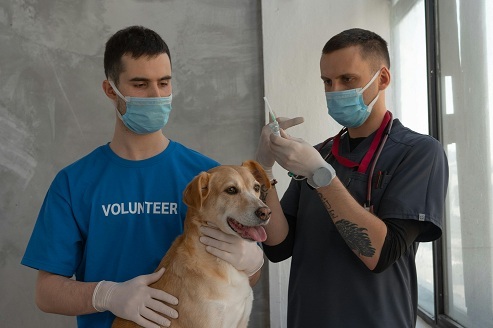
Vaccination is a cornerstone of preventive healthcare for both humans and animals. When it comes to our beloved canine companions, ensuring their protection against deadly diseases like rabies is paramount.
However, questions often arise regarding the effectiveness of dog vaccines, as well as their implications for humans. In this article, we’ll delve into these queries and shed light on the facts surrounding dog vaccinations.
Are Dog Vaccines 100% Effective for Humans?
Vaccines engineered for dogs are meticulously designed to combat canine-specific diseases, rendering them unsuitable for human use. Despite shared afflictions like rabies, separate vaccines tailored for each species exist.
Administering dog vaccines to humans or vice versa is not only ineffective but potentially harmful. Tailored vaccines account for species-specific physiological differences, ensuring optimal immune response and safety.
Thus, while dogs and humans may encounter similar diseases, vaccination strategies must remain species-specific to guarantee efficacy and prevent adverse reactions.
How Long Is the Anti-Rabies Vaccine Effective in Humans?
The duration of immunity conferred by the anti-rabies vaccine in humans varies based on factors such as vaccine type and individual immune response.
Typically, the standard rabies vaccination regimen involves a series of doses administered within a specific timeframe. After completing the initial series, booster shots might be necessary at regular intervals to ensure ongoing immunity.
While the duration of protection fluctuates among individuals, research indicates that the rabies vaccine can offer immunity for several years. In some cases, individuals may maintain protection for over a decade post-vaccination.
However, it’s important to note that the efficacy of the rabies vaccine can diminish over time, underscoring the importance of staying up-to-date with booster doses as recommended by healthcare professionals.
Regular vaccination remains crucial in safeguarding against the potentially fatal consequences of rabies infection.
How Long Is Rabies Vaccine Good for Dogs?
The duration of immunity conferred by rabies vaccines in dogs hinges on multiple factors. Firstly, the type of vaccine utilized influences its longevity.
Modern vaccines are engineered to provide extended immunity, while older formulations might offer shorter-term protection.
Additionally, the overall health status of the dog plays a crucial role; immunocompromised animals may have diminished vaccine efficacy.
After the initial round of vaccinations, booster shots are essential to bolster and sustain immunity. Veterinary guidelines underscore the importance of these boosters, typically recommending them every one to three years.
However, the specific interval may vary based on regional regulations and the recommendations of vaccine manufacturers.
These intervals are designed to strike a balance between maintaining adequate protection and minimizing unnecessary vaccination.
Additionally, factors such as the prevalence of rabies in the area and the dog’s lifestyle may also influence the frequency of booster shots.
Ultimately, responsible pet ownership entails adhering to these vaccination schedules to safeguard not only the health of individual dogs but also to contribute to the broader efforts of rabies prevention and control.
Regular consultations with veterinarians can help tailor vaccination plans to suit the unique needs of each dog, ensuring optimal protection against this deadly disease.
Puppy composition notebooks: vaccinate and protect your dog after purchase
How Long After Rabies Vaccine Expired Is It Effective for Dogs?
The effectiveness of a rabies vaccine in dogs significantly diminishes once it has expired. Veterinarians caution against using expired vaccines as they cannot guarantee sufficient protection against rabies or other diseases.
Expired vaccines may have undergone chemical changes that compromise their potency and ability to stimulate an adequate immune response in dogs.
While some residual immunity may persist for a short period after the expiration date, relying on expired vaccines for long-term protection is ill-advised.
Furthermore, administering expired vaccines not only puts dogs at risk but also undermines efforts to control and prevent the spread of rabies.
It’s imperative for dog owners to strictly adhere to recommended vaccination schedules, ensuring that their pets receive vaccines within their designated shelf life.
By prioritizing timely vaccinations and avoiding the use of expired products, dog owners can help safeguard the health and well-being of their beloved companions against rabies and other infectious diseases.
Pet Passport notebook: Vaccination records | neutering records | veterinary appointment records
Is the Rabies Vaccine 100% Effective for Dogs?
Rabies vaccines for dogs have proven to be highly effective in preventing the disease, although they cannot guarantee complete protection.
The efficacy of the vaccine is influenced by various factors, including the quality of the vaccine itself, how it is administered, and the unique immune response of each individual dog.
While most vaccinated dogs develop immunity against rabies, there is still a small chance of vaccine failure.
Despite this, the implementation of widespread vaccination campaigns has played a crucial role in reducing the prevalence of rabies among canine populations.
By vaccinating a significant proportion of dogs in an area, herd immunity can be achieved, further minimizing the risk of rabies transmission.
This not only protects individual dogs but also helps to safeguard public health by reducing the likelihood of human exposure to the virus through dog bites.
Additionally, the effectiveness of rabies vaccination in dogs is supported by rigorous testing and quality control measures implemented by regulatory authorities and vaccine manufacturers.
This ensures that vaccines meet stringent safety and efficacy standards before being made available to the public.
In summary, while the rabies vaccine for dogs is not 100% effective, it remains a crucial tool in preventing the spread of rabies and protecting both canine and human populations.
Continued efforts to promote vaccination, coupled with responsible pet ownership practices such as keeping dogs up-to-date on their vaccinations and avoiding contact with potentially rabid animals, are essential in maintaining the progress made in controlling this deadly disease.
Vaccination: What You Must Know Before You Vaccinate Your Dog
Is the Rabies Vaccine 100% Effective for Humans?
The rabies vaccine for humans, much like its counterpart for dogs, is a highly effective preventive measure against rabies virus infection.
When administered correctly and supplemented with post-exposure prophylaxis (PEP), it offers robust protection. PEP involves a combination of the rabies vaccine and rabies immune globulin (RIG) given promptly after exposure to the virus.
This dual approach helps neutralize the virus and stimulates the immune system to produce antibodies, providing immediate and long-term immunity.
However, despite its effectiveness, the rabies vaccine is not infallible. In rare instances, individuals may not develop sufficient immunity even after vaccination, leading to vaccine failure.
Factors such as the timing of vaccination, the severity of exposure, and individual immune response can influence vaccine efficacy. Despite these rare occurrences, the overall benefits of vaccination far outweigh the risks associated with rabies infection.
Rabies is a fatal disease, and without timely intervention, the consequences can be dire.
Moreover, the rabies vaccine has undergone rigorous testing and continues to be refined to enhance its efficacy and safety profile. Research and surveillance efforts continuously evaluate vaccine performance and identify areas for improvement.
Public health initiatives promote widespread vaccination campaigns to mitigate the risk of rabies transmission, particularly in regions where the disease is endemic.
In summary, while the rabies vaccine for humans is highly effective, it is not guaranteed to provide absolute protection in every case.
Nonetheless, when administered correctly and supplemented with post-exposure prophylaxis, it significantly reduces the risk of rabies infection and its potentially fatal consequences.
Vigilance in vaccination efforts remains paramount in the ongoing battle against rabies.
Does Rabies Vaccine Last Longer Than 3 Years?
Research indicates that the rabies vaccine can confer immunity for an extended period, surpassing three years in both humans and dogs.
Studies have demonstrated that the immunity stimulated by the rabies vaccine often endures for many years, potentially extending beyond the typical vaccination intervals.
This sustained immunity is a testament to the effectiveness of the rabies vaccine in providing long-term protection against the rabies virus.
However, despite the potential longevity of immunity, it is essential to adhere to regular booster vaccinations as recommended by veterinary and public health authorities.
These booster vaccinations serve to bolster and maintain immunity levels, ensuring continuous protection against rabies infection.
By staying up-to-date with booster vaccinations, individuals can mitigate the risk of waning immunity and help safeguard themselves and their pets against the threat of rabies.
Pet Medical Record Sheets for Vets
Conclusion
In conclusion, dog vaccines play a crucial role in protecting canine companions from a range of infectious diseases, including rabies. While vaccines are highly effective tools in disease prevention, they are not without limitations.
Understanding the factors that influence vaccine efficacy and adhering to recommended vaccination schedules are essential for safeguarding the health and well-being of both dogs and humans.
By staying informed and proactive about vaccination, pet owners can help ensure a safer and healthier environment for their furry friends and themselves.
Further Reading:
Duration of immunity after rabies vaccination in dogs
Rabies is 100% vaccine preventable
FAQs:
How effective are vaccines for dogs?
Vaccines for dogs are highly effective in preventing a range of diseases, including rabies, parvovirus, and distemper. They significantly reduce the risk of infection and transmission within the dog population. However, effectiveness can vary depending on factors such as vaccine quality, administration, and individual immune response. Adhering to recommended vaccination schedules and guidelines ensures optimal protection for dogs against potentially life-threatening illnesses.
�
Is rabies vaccine 100% effective for dogs?
While the rabies vaccine for dogs is highly effective, it is not guaranteed to provide absolute protection. Factors such as vaccine quality, administration, and individual immune response can influence efficacy. However, widespread vaccination efforts have significantly reduced the incidence of rabies in canine populations, underscoring the importance of vaccination in disease prevention and control.
�
Is rabies vaccine 100%?
No vaccine, including the rabies vaccine, is 100% effective. While highly successful in preventing rabies, there’s always a small possibility of vaccine failure. Factors like individual immune response and vaccine quality can influence efficacy. Despite this, widespread vaccination efforts have significantly reduced rabies incidence in both humans and animals, emphasizing the importance of vaccination in disease prevention and control.
�
Can a dog still get rabies after being vaccinated?
While rare, it’s possible for a vaccinated dog to contract rabies if exposed to the virus. Vaccination significantly reduces the risk, but it’s not a guarantee against infection. Prompt veterinary care is crucial if a vaccinated dog encounters a rabid animal or displays symptoms, as post-exposure treatment may still be necessary to prevent the development of rabies. Regular booster vaccinations are essential to maintain immunity levels and further minimize the risk of rabies transmission.

2a71et